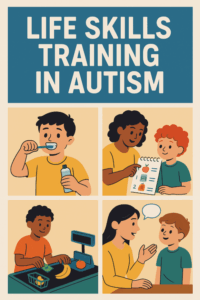Life Skills Training in Autism: Building Independence, One Step at a Time
 🔍 What Are Life Skills in Autism?
🔍 What Are Life Skills in Autism?
Life skills are the everyday abilities that allow a person to live independently and function in society. For children and adolescents with autism, life skills training is not optional—it’s essential for future independence, dignity, and self-confidence.
These skills include:
-
Personal hygiene (brushing, bathing, dressing)
-
Food preparation and eating habits
-
Money handling and shopping
-
Using public transport
-
Time management and daily routines
-
Safety awareness and emergency response
-
Social interaction and communication basics
💡 Why Is Life Skills Training Important for Autistic Individuals?
Autistic children may face challenges in:
-
Executive functioning (planning, organizing, completing tasks)
-
Social understanding (knowing what to say, when to say it)
-
Sensory processing (handling textures, noise, temperature)
-
Motor coordination (buttoning shirts, tying laces)
These difficulties can delay the development of life skills, but with structured support, they can learn and thrive.
🧩 When to Start Life Skills Training?
The earlier, the better.
You can begin life skills as early as 2 to 3 years old, using play-based routines. By adolescence, these skills should be intentionally expanded and customized for adulthood.
🛠️ How to Teach Life Skills to Autistic Children
-
Break tasks into small steps
Use visual aids or checklists. For example:Brushing teeth = Wet brush → Apply paste → Brush → Rinse → Wipe mouth
-
Use visual schedules
Pictures of daily activities in sequence reduce anxiety and increase routine-following. -
Practice in real-world settings
Supervised visits to shops, banks, or bus stops make learning more practical. -
Model the behavior and use role-play
Practice social scripts like:“Excuse me, can you help me?” or “Thank you for your help.”
-
Reward efforts, not perfection
Encouragement builds motivation and reduces frustration. -
Repeat, review, reinforce
Repetition is key—what looks like stubbornness is often difficulty in generalizing across settings.
🧑🏫 Who Should Be Involved?
-
Parents – your child’s first and most consistent teacher
-
Special educators and occupational therapists – for customized task-based training
-
Speech therapists – for social and communication skills
-
Psychiatrists – to assess for coexisting conditions (like ADHD, anxiety) and guide overall development
In my clinical practice, we integrate life skills goals into the child’s overall intervention plan from the beginning.
💬 Real-Life Example
Aarav, a 12-year-old boy with autism, could solve math problems but didn’t know how to pack his school bag or order food. With structured weekly sessions and home reinforcement, he learned how to shop at a supermarket, use a wallet, and ask for help when confused. His confidence—and his parents’ hope—transformed.
🌱 The Long-Term Goal
Not just academics—functional independence.
Life skills are the foundation for:
-
Future employment
-
Independent living
-
Social integration
-
Self-esteem and mental health
🔍 SEO Keywords Used:
-
Life skills training in autism
-
Autism independence
-
Daily living skills for autistic children
-
Functional training for autism
-
Autism parenting tips India
-
Early intervention autism India
📍 Dr. Srinivas Rajkumar T
Consultant Psychiatrist – Child, Adolescent & Geriatric Psychiatry
Apollo Clinics Velachery & Tambaram | Mind & Memory Lab
🌐 www.srinivasaiims.com | 📞 +91 85951 55808
Offering early autism diagnosis, life skills training plans, and holistic neurodevelopmental care.